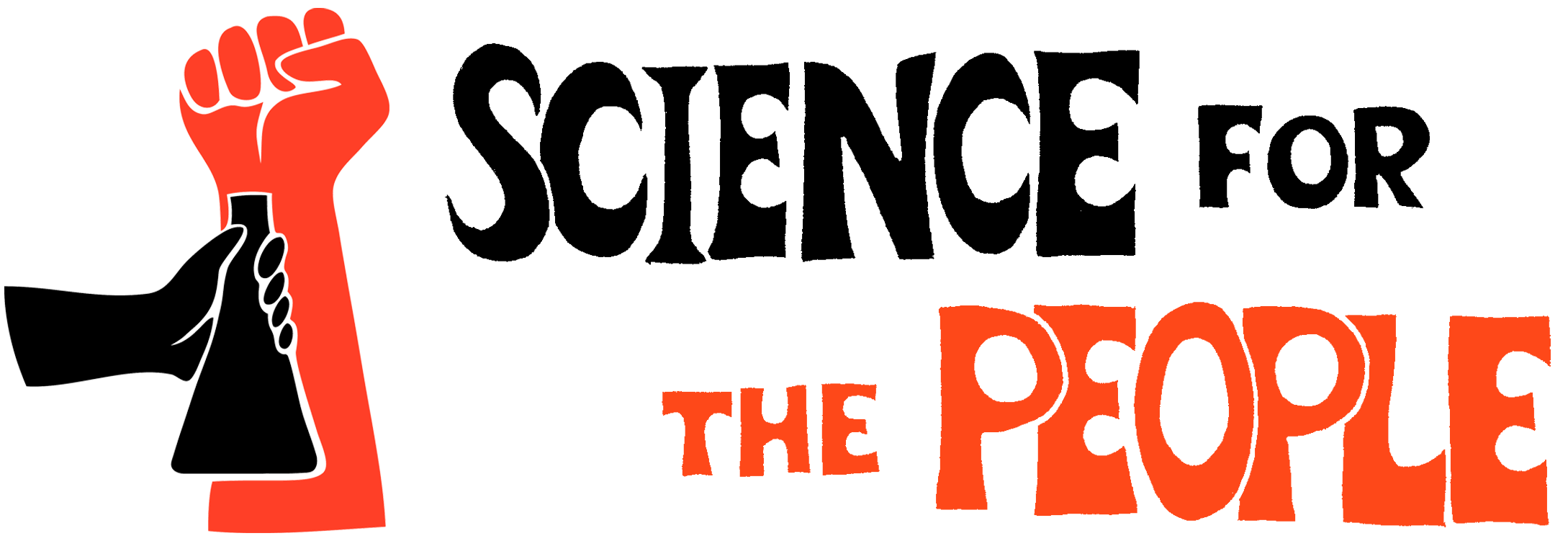See also the pages for the 2020 People’s Science Fair and past community workshops.
****************
CLIMATE ACTIONS FOR SEPTEMBER 20 and 27
Western Mass Science for the People was proud to co-sponsor the following events:
********************************
The Resistance Film Series Presents:
Jane: An Abortion Service
Co-sponsored by Western Mass Science for the People and Tapestry Health
Wednesday, August 28, 6:30 p.m. Forbes Library Community Room
Led by activist Heather Booth, a secret, women-run abortion service flourished in the Midwest from the late ‘60s to the 1973 Roe decision – a time when abortions were illegal and dangerous. It is time to revisit this history and talk about the future of community-led health initiatives today.
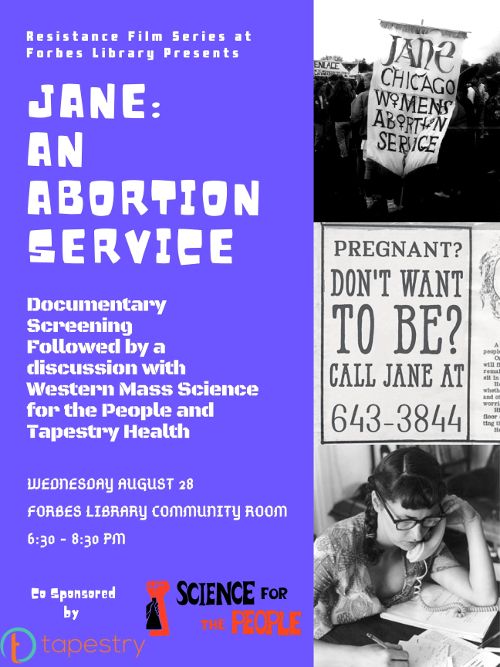
****************************
SftP Tabling at Juneteenth and the Mold Gala
For the second year, SftP members tabled at the annual Juneteenth event organized by Arise in Springfield. This year it was held in Pendleton Park. (Juneteenth celebrates the abolition of slavery in the US.) Ten days later we did it all again in the Arise parking lot for Tatiana’s Mold Gala, which raised community awareness about the health consequences of mold. Brian’s insect collection inspired lots of kids — and quite a few adults as well. We also passed out information on mold, copies of board games from Kenya and Tanzania with interesting math and logic components, stickers, and of course SftP brochures.
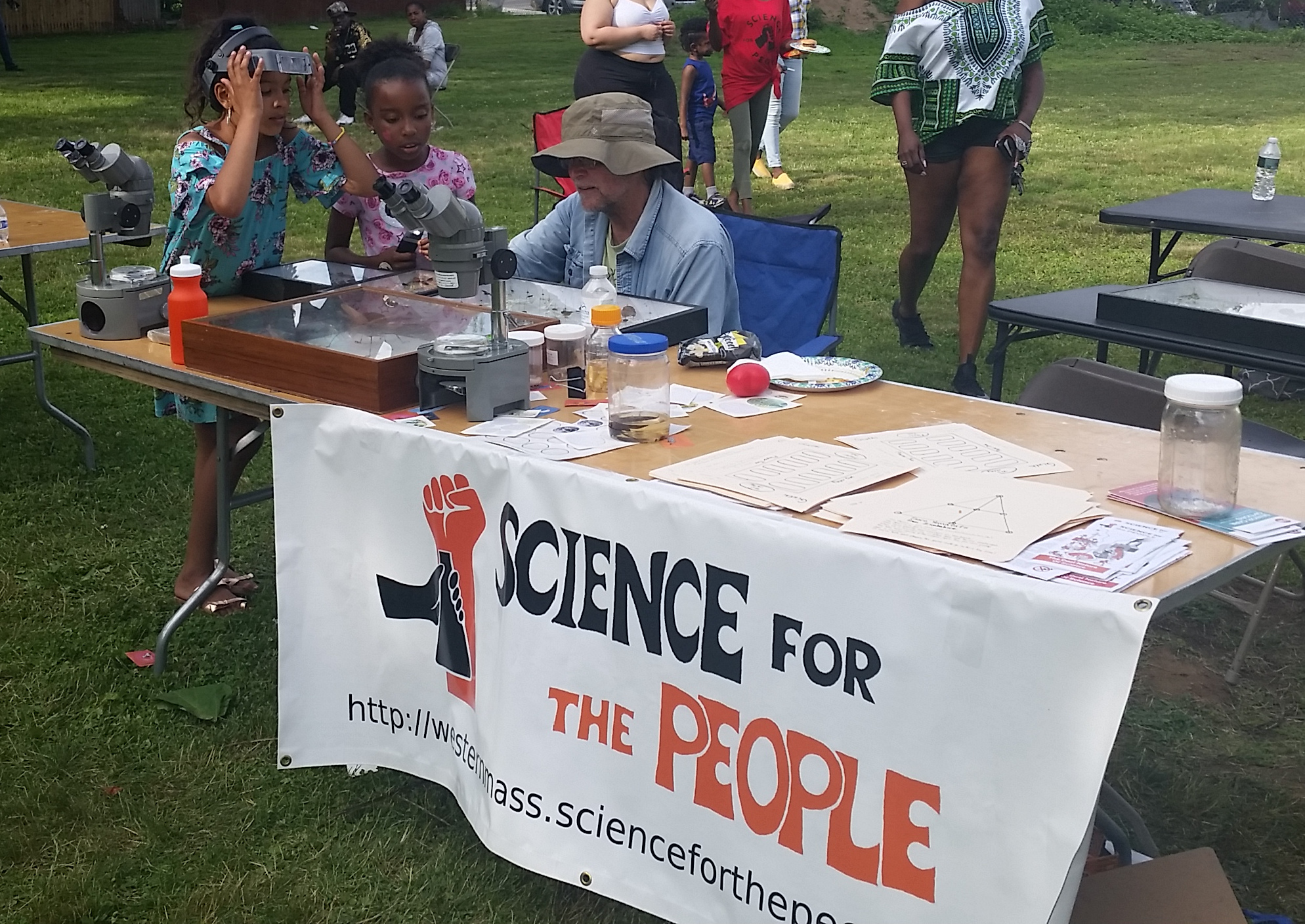
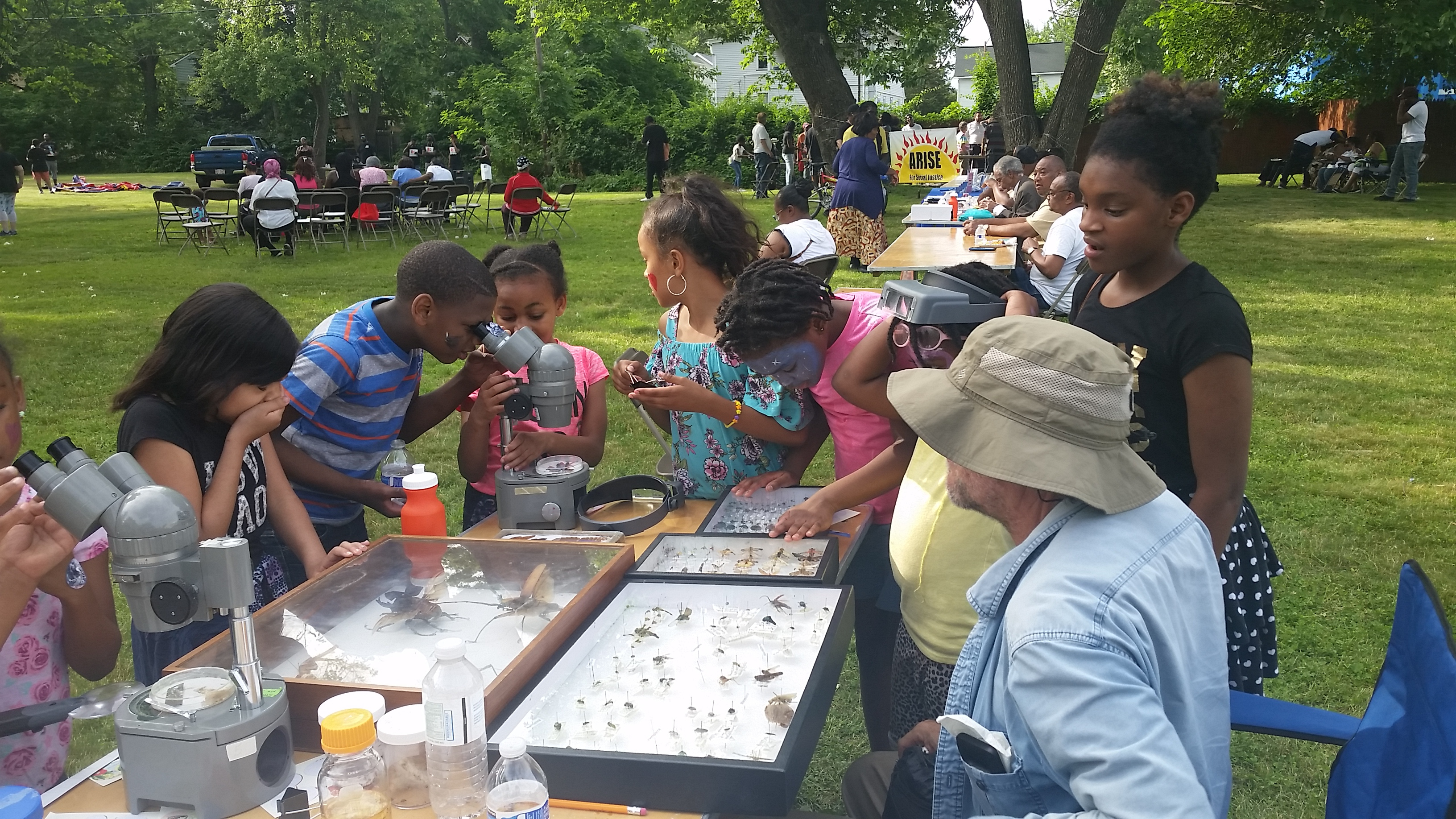
*************
Elementary School Program on People’s Science and Agro-Ecology
Western Mass SftP members Sigrid Schmalzer and Brian Schultz teamed up to provide a program for children at Bridge Street and many other entomologists coSchool in Northampton. It began with Sigrid (a historian) offering an interactive reading of her picture book Moth and Wasp, Soil and Ocean: Remembering Chinese Scientist Pu Zhelong’s Work for Sustainable Farming. The book introduces children to the use of parasitic wasps as an ecologically sensible method for controlling insect pests and to the history of science in socialist China, where scientists and farmers were expected to collaborate to create new knowledge suitable to local communities.
A few weeks later, Brian and Sigrid participated in two full days of the Bridge Street School garden program. Brian (an entomologist) brought his amazing insect collection, microscope, live parasitic wasps (they’re tiny!) recently hatched out of egg cards, and live lady bugs for kids to hold and release. Class after class of kids had the chance to see the wasps that Pu Zhelong used and that Brian uses in his research as well. It was fun and meaningful!
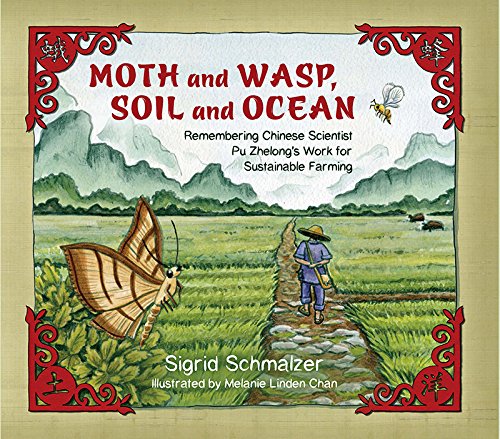
*************
Radical Science Short Film Share-Fest!
We hosted share-fests at UMass and at the incredible new WOW Art Studio in Springfield.
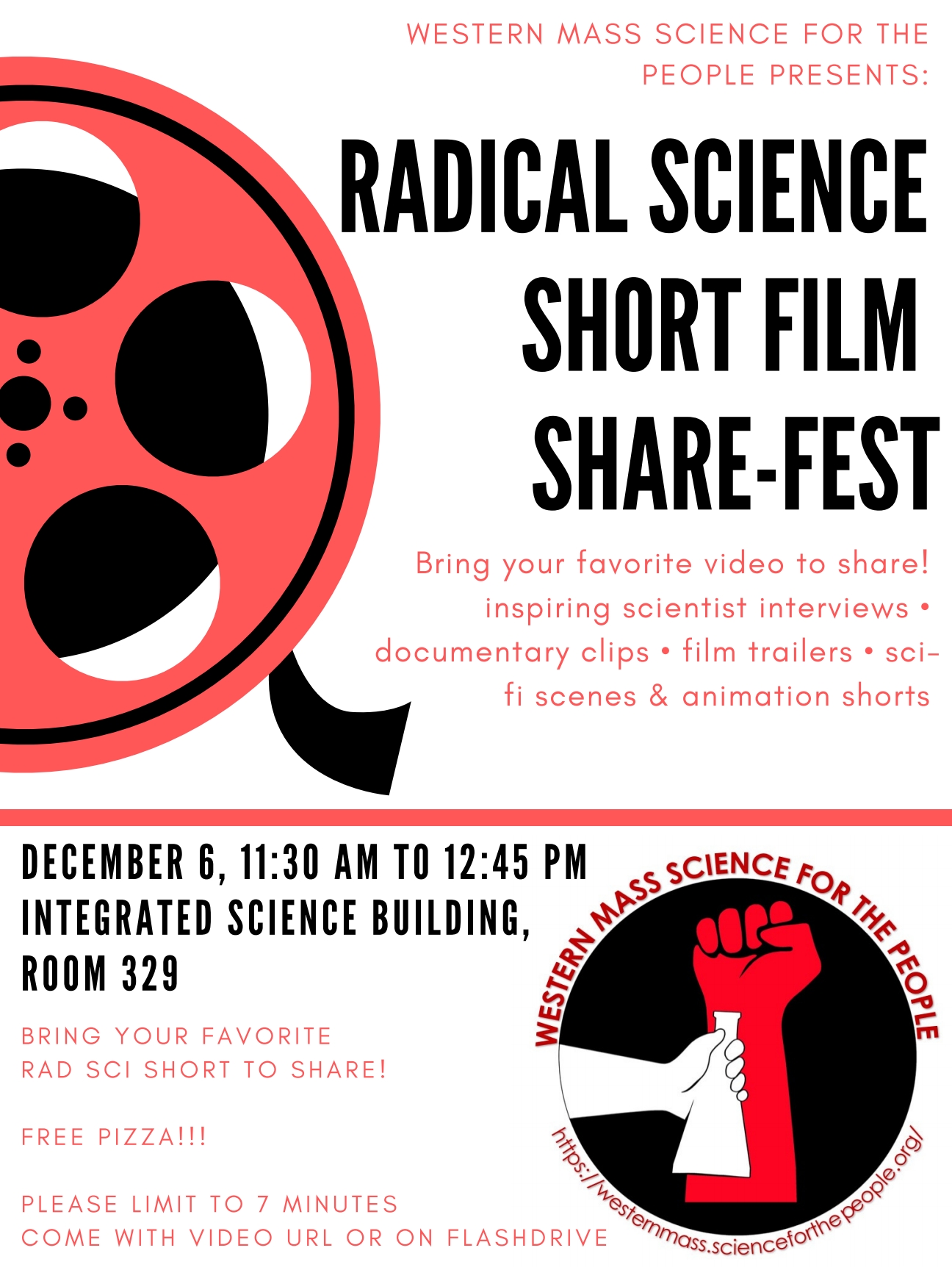
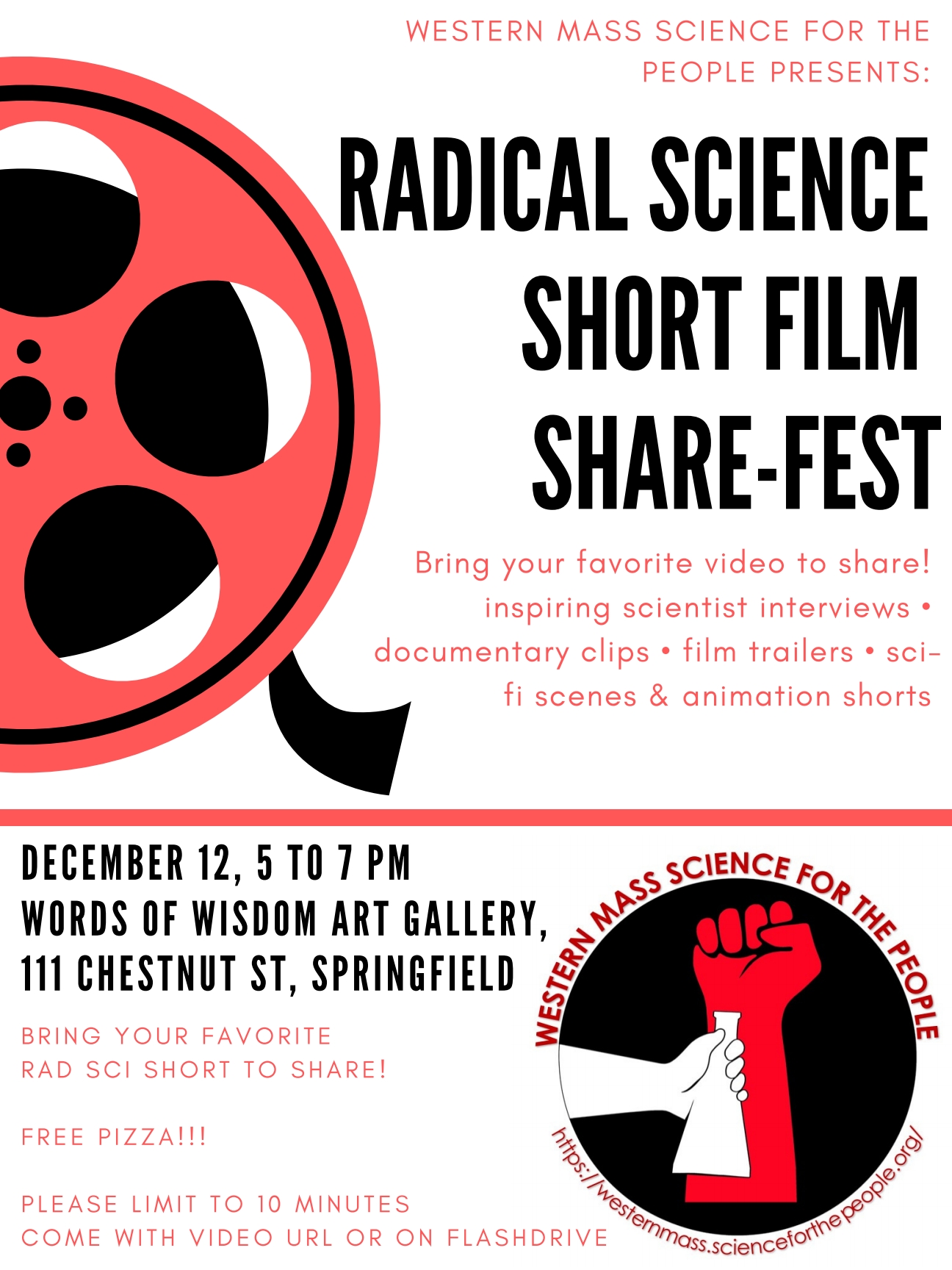
*************
Beginning to End Hunger Book Talk
Tuesday, September 25, 4:00-5:30 at Thompson 620, UMass
The Western Mass Chapter of Science for the People invites the public to join political agroecologist M. Jahi Chappell in a discussion of his path-breaking new book: Beginning to End Hunger: Food and environment in Belo Horizonte, Brazil and beyond.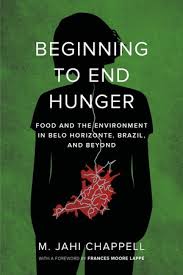 Chappell presents the story of Belo Horizonte, home to 2.5 million people and the site of one of the world’s most successful food security programs. Since its Municipal Secretariat of Food and Nutritional Security was founded in 1993, Belo Horizonte has sharply reduced malnutrition, leading it to serve as an inspiration for Brazil’s renowned Zero Hunger programs. The secretariat’s work with local family farmers shows how food security, rural livelihoods, and healthy ecosystems can be supported together. In this convincing case study, M. Jahi Chappell establishes the importance of holistic approaches to food security, suggests how to design successful policies to end hunger, and lays out strategies for enacting policy change. With these tools, we can take the next steps toward achieving similar reductions in hunger and food insecurity elsewhere in the developed and developing worlds.
Chappell presents the story of Belo Horizonte, home to 2.5 million people and the site of one of the world’s most successful food security programs. Since its Municipal Secretariat of Food and Nutritional Security was founded in 1993, Belo Horizonte has sharply reduced malnutrition, leading it to serve as an inspiration for Brazil’s renowned Zero Hunger programs. The secretariat’s work with local family farmers shows how food security, rural livelihoods, and healthy ecosystems can be supported together. In this convincing case study, M. Jahi Chappell establishes the importance of holistic approaches to food security, suggests how to design successful policies to end hunger, and lays out strategies for enacting policy change. With these tools, we can take the next steps toward achieving similar reductions in hunger and food insecurity elsewhere in the developed and developing worlds.
M. Jahi Chappell is a political agroecologist with training in ecology and evolutionary biology, science and technology studies, and chemical engineering. He is a Senior Research Fellow at the Centre for Agroecology, Water and Resilience (CAWR) at Coventry University, a Fellow of Food First/the Institute for Food and Development Policy, and an Adjunct Faculty member of the School of the Environment at Washington State University.
Mold, Housing, and Health: A Community Conversation with Tatiana ‘the Mold Lady’ and UMass Genomicist Li-Jun Ma.
Saturday, April 12, 1:00-3:00 at Arise for Social Justice, Springfield (467 State Street). Download PDF of Poster here

March for Science in Boston
Our chapter has decided that our energy (both human-carbon and fossil-carbon) will best be spent locally working on community organizing like the Mold event. However, the Boston chapter will be ensuring a presence for Science for the People at the Boston March for Science on Saturday, April 14th.

Invest in Minds not Missiles: Resisting the Trillion-Dollar Nuclear Weapons Escalation
A lecture by MIT biologist and Science for the People member Jonathan King. Wednesday, October 25, 4:00 p.m., Gordon Hall 303, UMass Amherst
Sponsored by Western Mass Science for the People and the UMass Political Economy Research Institute

The growth of higher education and university-based scientific research in the U.S. after WWII has been critically dependent on federal investments, voted annually as part of the congressional discretionary budget. In recent years more than 55% of this budget—our income taxes—has been spent on war and weapon purchase accounts. Recently President Trump proposed more cuts in key programs supporting education and research—including NIH, NSF, EPA, and NOAA—in order to fund a $54 billion increase (~10%) in military spending. This will bring the fraction of our tax dollars spent on preparation for war to more than 60% of the total congressional budget. Many of the weapons programs—such as the proposed trillion-dollar nuclear weapons “modernization”—are provocative and destabilizing, more likely to decrease national security than increase it. The excessive costs will greatly weaken programs addressing social needs. Defending higher education and basic research will require explicitly resisting the diversion of our tax dollars to military accounts.
Speaker Biography:
Jonathan Alan King is a professor of molecular biology at MIT, where he has long taught biochemistry and directed biomedical research on protein misfolding and human disease <http://web.mit.edu/king-lab>. King is a past president of the national Biophysical Society, a former Woodrow Wilson Fellow, Jane Coffin Childs Fund Fellow, and Guggenheim Fellow, and a recipient of the NIH MERIT Award. Long involved in issues of science and society, Prof. King was a member of the original Science for the People. He served for many years on the Federation of American Societies for Experimental Biology’s national committee addressing the federal R& D budget, as well as the national Joint Committee on Biomedical Research. He was also a leader of the national campaign of biomedical scientists to press the Senate to ratify the Biological Weapons Convention and helped organize a successful campaign against anthrax research at UMass Amherst. King currently serves on the Board of Massachusetts Peace Action and chairs its Nuclear Disarmament Working Group. He is also active in the national People’s Budget Coalition that supports the Congressional Progressive Caucus on federal budget priorities.
Co-sponsors:
Massachusetts Society of Professors, Public Higher Education Network of Massachusetts, UMass History Department, UMass Social Thought & Political Economy Program, UMass Resistance Studies Initiative, Northampton Committee to Stop the Wars, Resistance Center for Peace and Justice.
Graduate Women in STEM
New Issue of GQM, the Magazine of GWIS (Graduate Women in STEM). A shout-out to Joelle Labastide and her colleagues in GWIS for putting out another great issue of GQM. This issue is titled Tuning In and includes articles, art, and even STEM-related playlists.
